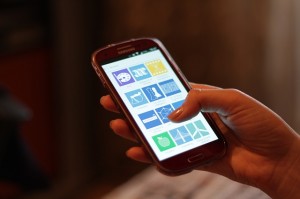Recently, we looked at location-based mobile apps and their ability to allow us to interact with our surrounding environment. Examples of this trend include “checking in” to a business, finding other people nearby or redeeming a special deal.
Beyond possible issues with surveillance and ad targeting, this business of walking around using our smartphones raises another crucial societal question: can our mobile devices help us engage with our surroundings and not just distract us from them?
Many cultural critics lament the trend of people always buried in their phones, oblivious to what’s happening in their immediate vicinity. It has gone so far that a form of social anxiety called FOMO (fear of missing out) has even been coined to describe how today’s constant social connectivity can lead to “compulsive checking for status updates and messages, for fear of missing an opportunity.”
Because of this, some feel that smartphones should be banned in particular situations, or at least strongly discouraged. And others claim we must disconnect fully in order to fully experience what we are doing. But with both of these reactions it is implied that people are doing tasks wholly separate from their surroundings, like checking Facebook or watching Youtube videos.
But this isn’t the only way our devices can be used. As many of the location-based apps suggest, we can instead augment our experience in various ways. So instead of taking away our devices altogether, we can rethink how they are used.
If you are watching a baseball game, for example, using a mobile device to check an item in the box score or pull up a spray chart to see where the current batter hits would likely enhance that situation. And if you are watching with others it could even help connect you as a group. Conversely, looking up a player’s bio on Wikipedia and then proceeding to mindlessly click on link after link for 25 minutes would be a disconnecting behavior.
Some actions aren’t so clear cut. If Major League Baseball is promoting a particular Twitter hashtag for the game, for example, would it be enhancing or distracting if you post a quick observation and see how other fans respond?
This example illustrates how using mobile devices to enhance our real-life experiences is a tricky proposition. There certainly is potential, but staying on track anytime we pull out a smartphone is a significant challenge. When emails, social networks and clickbait headlines are but a tap away (and often come straight to us in the form of notifications) it can be tough to stay focused on a singular task and avoid an extended “multi-taking” session checking up on everything we can.
Microsoft researcher Jaime Teevan adds an important idea in a blog post calling for a switch from the term “personal devices” to “social devices.”
She believes there is fantastic potential for mobile devices to connect us and argues that this will become more prevalent as mobile technology advances.
A crucial factor, Teevan says, is for our devices to be able “support input and output modalities that require minimal attention to the device, leaving the user’s attention free to focus on the people around them.”
For example, they could input info into their device “merely by tapping their pocket, or get(ting) output from their phone via vibration,” which doesn’t remove their attention from the current situation. The real-life application Teevan provides is a presentation where “audience feedback is aggregated and reflected back to attendees alongside the presenter’s PowerPoint slides.”
Teevan also argues mobile apps can support face-to-face interactions by augmenting existing physical signals, and supporting existing verbal communication, and she provides additional interesting examples.
What do you think about mobile apps being a complement to, rather than a distraction from, the real world?












Speak Your Mind